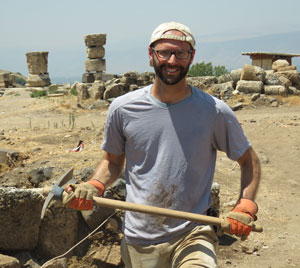Recorded: January 22, 2021
Event: Pourdavoud Center Lecture Series
Citation: Schlude, Jason. "Rome, Parthia, and the Politics of Peace: The Origins of War in the Ancient Middle East," Pourdavoud Center Lecture Series. January 22, 2021
by Jason Schlude (College of Saint Benedict and Saint John’s University)
Rome, Parthia, and the Politics of Peace: The Origins of War in the Ancient Middle East
This volume offers an informed survey of the problematic relationship between the ancient empires of Rome and Parthia from c. 96/95 BCE to 224 CE. Schlude explores the rhythms of this relationship and invites its readers to reconsider the past and our relationship with it.
Some have looked to this confrontation to help explain the roots of the long-lived conflict between the West and the Middle East. It is a reading symptomatic of most scholarship on the subject, which emphasizes fundamental incompatibility and bellicosity in Roman–Parthian relations. Rather than focusing on the relationship as a series of conflicts, Rome, Parthia, and the Politics of Peace responds to this common misconception by highlighting instead the more cooperative elements in the relationship and shows how a reconciliation of these two perspectives is possible. There was, in fact, a cyclical pattern in the Roman–Parthian interaction, where a reality of peace and collaboration became overshadowed by images of aggressive posturing projected by powerful Roman statesmen and emperors for a domestic population conditioned to expect conflict. The result was the eventual realization of these images by later Roman opportunists who, unsatisfied with imagined war, sought active conflict with Parthia.
Rome, Parthia, and the Politics of Peace is a fascinating new study of these two superpowers that will be of interest not only to students of Rome and the Near East but also to anyone with an interest in diplomatic relations and conflict in the ancient world and today.
About the Speaker

Jason Schlude is an Associate Professor of Classics and Chair of the Department of Languages and Cultures at the College of Saint Benedict and Saint John’s University in Minnesota and Co-Director of the Omrit Settlement Excavation Project in Israel. A former Getty scholar, he is an ancient historian and archaeologist who specializes in the Roman Near East and the relationship between the Roman and Parthian Empires. He published Rome, Parthia, and the Politics of Peace: The Origins of War in the Ancient Middle East in 2020 (Routledge Press) and co-edited Arsacids, Romans, and Local Elites: Cross-Cultural Interactions of the Parthian Empire in 2017 (Oxbow Books), with related articles appearing in journals including Latomus, Athenaeum, and Anabasis. A member of the Avon Hills Salon (https://avonhillssalon.com), he also engages in public scholarship exploring the significance of the liberal arts and Classics in the modern world. His essays have appeared in Foreign Policy Journal (“Rome, Iran, and the Specters of Antiquity”), Minneapolis Star Tribune (e.g., “A Minnesota scholar shows how we could find common ground with, and through, Shia Islam”; “Ted Cruz, Cicero, and the classics”), The Activist History Review (e.g., “The Problem of White People, with Insight from St. Paul”; “The Politics of Consumption: From Trimalchio and Gatsby to Trump and Beyond”), Bible History Daily (“Herod the Great: Friend of the Romans and Parthians?”), and Avon Hills Salon (e.g., “The Art of Liberation: Life in the Liberal Arts”; “Infectious Nationalism: Pericles and Public Health Crises”). His poetry has appeared in Pericles at Play (“We Lived among the Bones”), with more forthcoming in Jesuits Magazine (“The Teacher”).

